Photo: James Medina
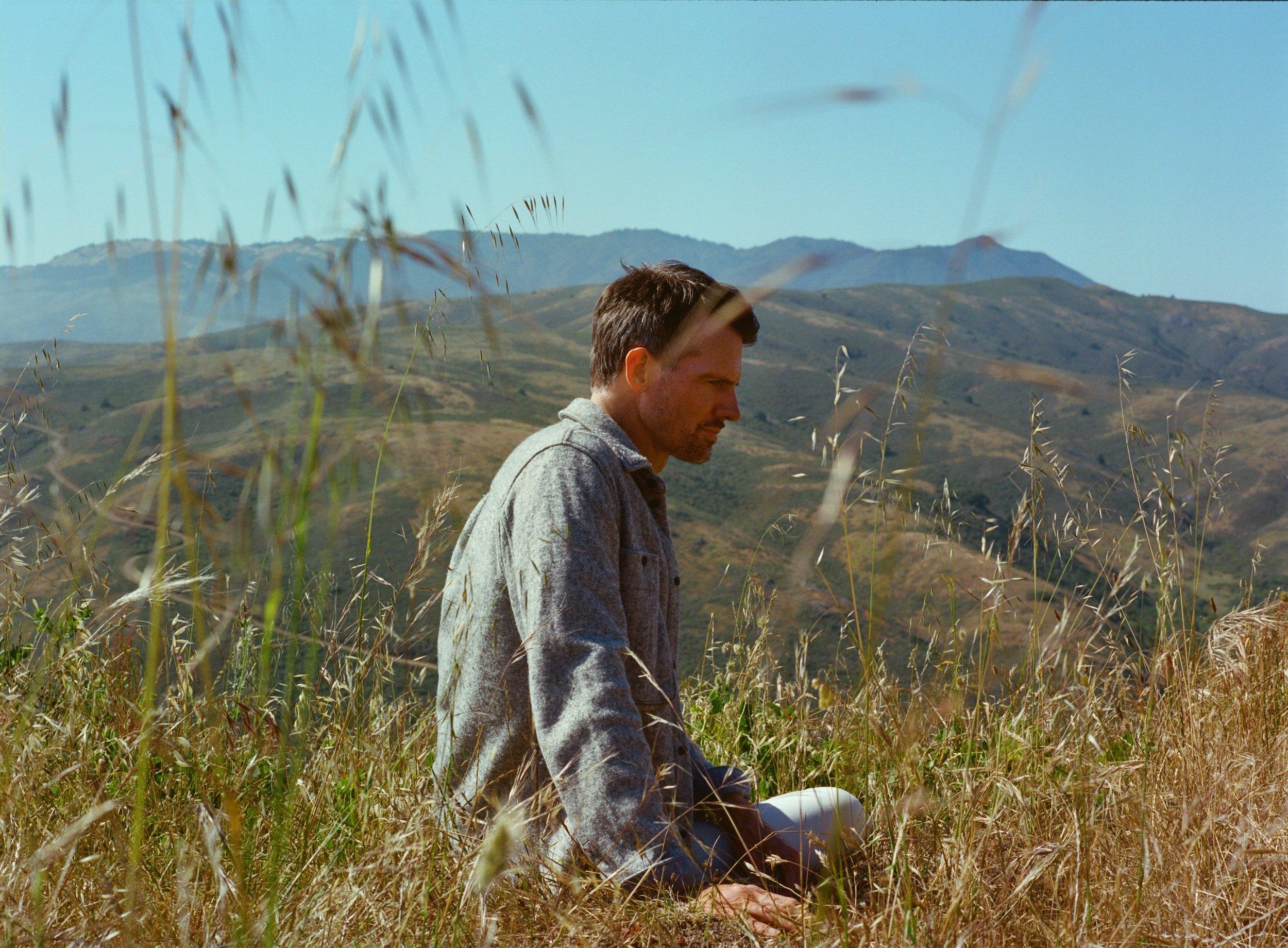
interview
Tycho's Scott Hansen Shares The Journey To 'Infinite Health': How His New Album Was An Exercise In Being "Grounded In The Now"
Tycho's latest unpacks a musical and existential continuum. Musician Scott Hansen discusses returning to his early love of electronic music and mining his emotional memories to create Infinite Health.'
At 47 years old, Scott Hansen, who produces and performs under the name Tycho, is very conscious of his health. Not just for the sake of his own survival, but for his wife and young children; he is concerned with how his health affects the people around him, both at the moment and in the future.
"Seeing these new lives come into the world and realizing they're just starting this journey and how much they're going to be affected by the experiences they have with you makes you think about your friends and your family, and everybody you've ever interacted with," Hansen says, adding that humanity is connected. "It's not really about each of us. It's about what impact you can make while you're here that's going to have downstream effects on that continuum of life."
The healthier he is, the more positive his impact will be, and, along the continuum, his positive impact can theoretically ripple out forever. This idea influenced the title of Tycho's new album, Infinite Health, and expands throughout its songwriting and production.
The musical continuum of his life has brought Hansen back to electronic music, which he first fell in love with in the '90s. Where Tycho's GRAMMY-nominated 2019 LP Weather featured a majority of vocal-driven songs led by the ghostly euphony of Saint Sinner, Infinite Health is grounded in electronic music production just like when he started his career.
"I play synths and guitar, but I'm not virtuosic at either of those things. The thing I've spent the 10,000 hours at is working in Reaper on a computer. That inspires me the most," Hansen says.
Infinite Health still has a natural feel Hansen plans to replicate with a live band on his upcoming tour, but the club aesthetic is the album's guiding light. A four-on-the-floor kick drives "Devices" forward beneath spirited trance synths; "Phantom" has a similarly dancey feel that's buoyed by swirling harp effects.
More instrumental stylings —such as the lo-fi, atmospheric "Green" — allude further back on the continuum. Before Hansen started producing music, he spent a lot of time by the American River in Sacramento, California; those memories were some of his most present when creating Infinite Health. And while Hansen was revisiting his past, he believes that staying present is healing.
"I spent most of my career thinking about tomorrow or a week from now, or a year from now, or even 10 years from now. Once you have kids, you realize you really can't live with it like that. Every moment you wanna hold onto and internalize and be something you can revisit and connect to," Hansen says. "That's what the album was about. Being present and not being concerned with what's coming down the road. I'm hoping that the album can do that for other people and create this meditative space, where you can be a little bit more grounded in the now."
GRAMMY.com spoke to Hansen about balancing the idea of staying present and considering his future impacts, exploring an older production style, and the danger he finds in complacency.
Two decades into Tycho, what was it like to make music with mostly electronic production like you did when you started your career?
I think it's impossible to put yourself back in that place. If I ever hear people talk about their favorite [Tycho] album, it's almost always Dive. Wrestling with what that means and whether you're supposed to do that again; I really don't like to get caught in that way of thinking. I don't think it's healthy going into the process to be like, I'm trying to make stuff like I did when I was a completely different person 20 years ago.
It's even hard to relate to the person I was at that time. You would hope that you have changed significantly over those years to the point where you can't even get yourself in that headspace of that process.
Anytime I try to too closely revisit something, it dawns on me that it's nearly impossible. Maybe the tools can be the same. But the way you use them and the outcome is never going to be remotely similar. If it is, I don't know what the point is, because if you already made that album, why are you trying to do it again?
"Devices" alludes to when you first fell in love with electronic music. How do you balance being inspired by your past, but also knowing you can’t too closely revisit something?
That song in particular was pretty in the moment. There was always this nostalgic element from that time that allowed me to accept ["Devices"] for what it was. Not try to modernize it or shift it in some other direction where I felt like it was gonna be cooler or more relevant.
This song is what it is. It makes me feel nostalgic about this time, and it's like channeling that experience. I'm just gonna respect it.
To relate that idea to the title, is having the ability to step back and accept the music for what it is healing for you?
Every album I felt like I was trying to prove something or climb up to another level, sonically. This was the first album where I felt super comfortable with what everything ended up being. We cut a lot of tracks for various reasons to keep this thing tight. It wasn't because I didn't believe in the song or I didn't think it was the right statement. What ended up on the album — every single song — I love what it is.
I've never been more comfortable and accepting of what [an] album is. There's no question marks involved for me. This is what the album's supposed to be. In that respect, it was very healing.
Now that you’ve reached that point where you can feel completely content with what an album is, will you be able to channel that into everything you make?
There's a danger in that. The complacency of that can lead to not pushing yourself or going outside of your comfort zone. You gotta pick and choose those moments.
I think the album was just so inspired for me. But on the next one, I definitely want to try to push myself. Where can we take this that is an evolution of what I had done previously? Or how can I push myself into a space where I'm not necessarily 100 percent comfortable so the results might be a little bit more interesting? Or just feel like another part of the spectrum instead of retreading some of the existing space?
You also create a lot of the visuals for the Tycho project. How did being so comfortable with this album influence the visuals as well?
Every time I've made a song that pushed the boundaries or was out of my comfort zone, it's harder for me to connect imagery to it. Whereas with this album in particular, I felt like I knew exactly what every song looked like and how it translated visually.
So, yes, it made that process a lot easier and a lot more inspired. "Green" is about the river in the town where I grew up, and that's what the video is. We went out and filmed the river and the area where I grew up.
How does building songs from memories like "Green" help you stay present?
That's something I struggle with a lot, the recapturing. For instance, in the video for "Green," there's a tension. I moved away from Sacramento, where I grew up, to San Francisco in 2006. I've always had this conflicted relationship with that choice. What would my life have been if I had never left?
Obviously, I never would have met my wife. I wouldn't have my kids. I love everything about what my life is now. But I used to just hang out at the river all the time. I just love that place. The place where I lived for the last 15 years in San Francisco was very urban. I thought my life was going to be this different thing, where I spent a lot more time connected to nature.
So, songs like "Green" for me, and making that video, almost capturing it and like eulogizing it, that actually did make me feel this sense of comfort. I can still channel that. It can still be something positive.
It also inspired me to start getting back there. I started taking my daughter back to Sacramento a lot more over the last year, inspired by those conclusions that I came to making the album. It's been really positive in that respect.
But to answer the question, when I create something that channels that [memory], it is this really comforting thing. It feels like this makes up for the fact that I don't get to spend as much time there as I would have hoped at an earlier time in my life.
I can see how making that song was healing. Reconnecting with a part of your life that has always had a certain amount of tension.
The other component is that when you have a family, you start to realize if I found myself being depressed or unhappy, it was a very selfish thing. Being fortunate to have had a family and found a partner in life makes you realize this is bigger than you.
I can deal with being sad for months or years at a time. But when you realize how that affects the people around you, you realize it's not that simple. It basically makes it an imperative. You have to try to be as emotionally healthy as you can be for your family and the people you love.
More Dance & Electronic Music News
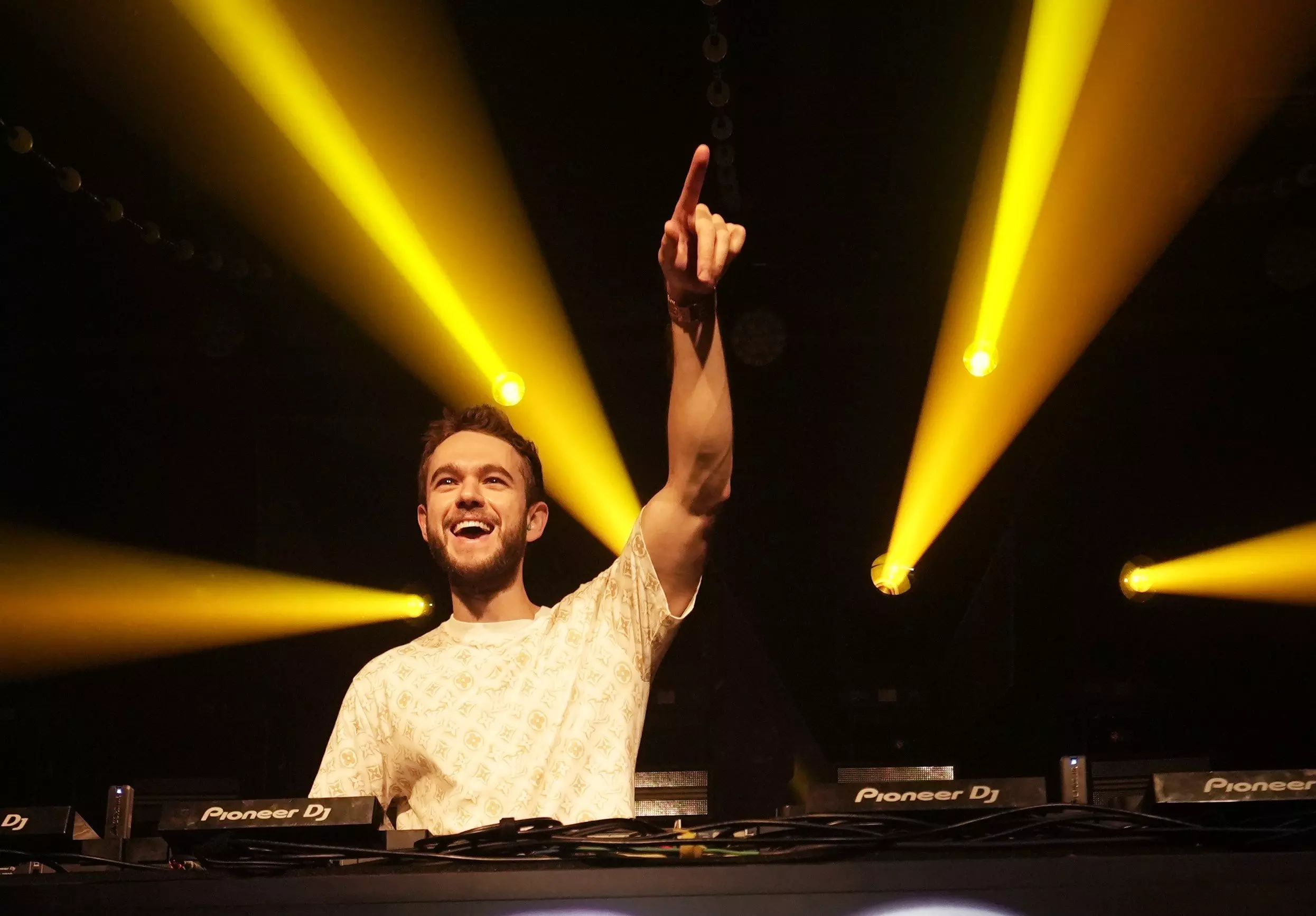
Zedd's Road To 'Telos': How Creating For Himself & Disregarding Commercial Appeal Led To An Evolutionary New Album
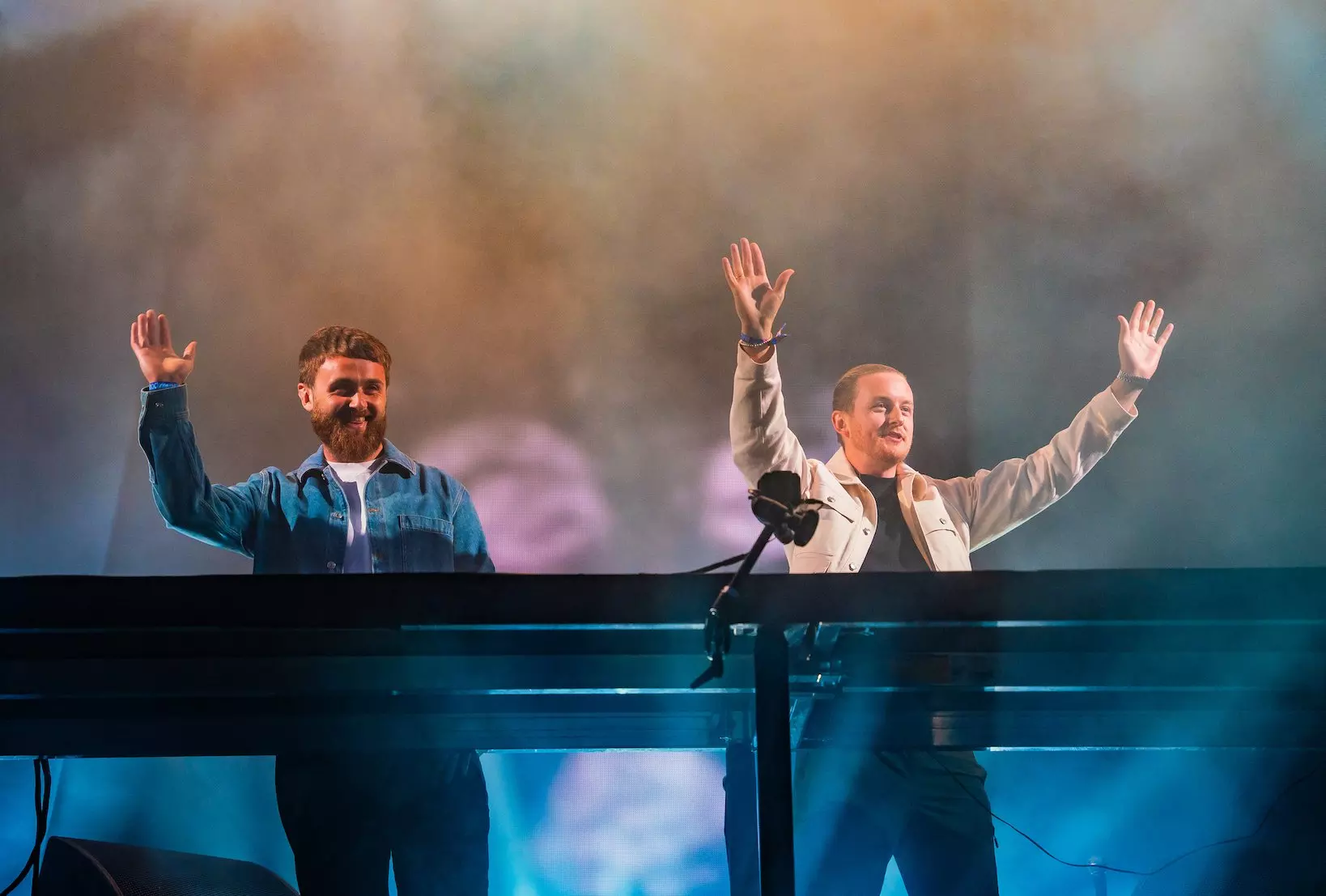
10 Cant-Miss Sets At HARD Summer 2024: Disclosure, Boys Noize, INVT & More
.webp)
Machinedrum's New Album '3FOR82' Taps Into The Spirit Of His Younger Years
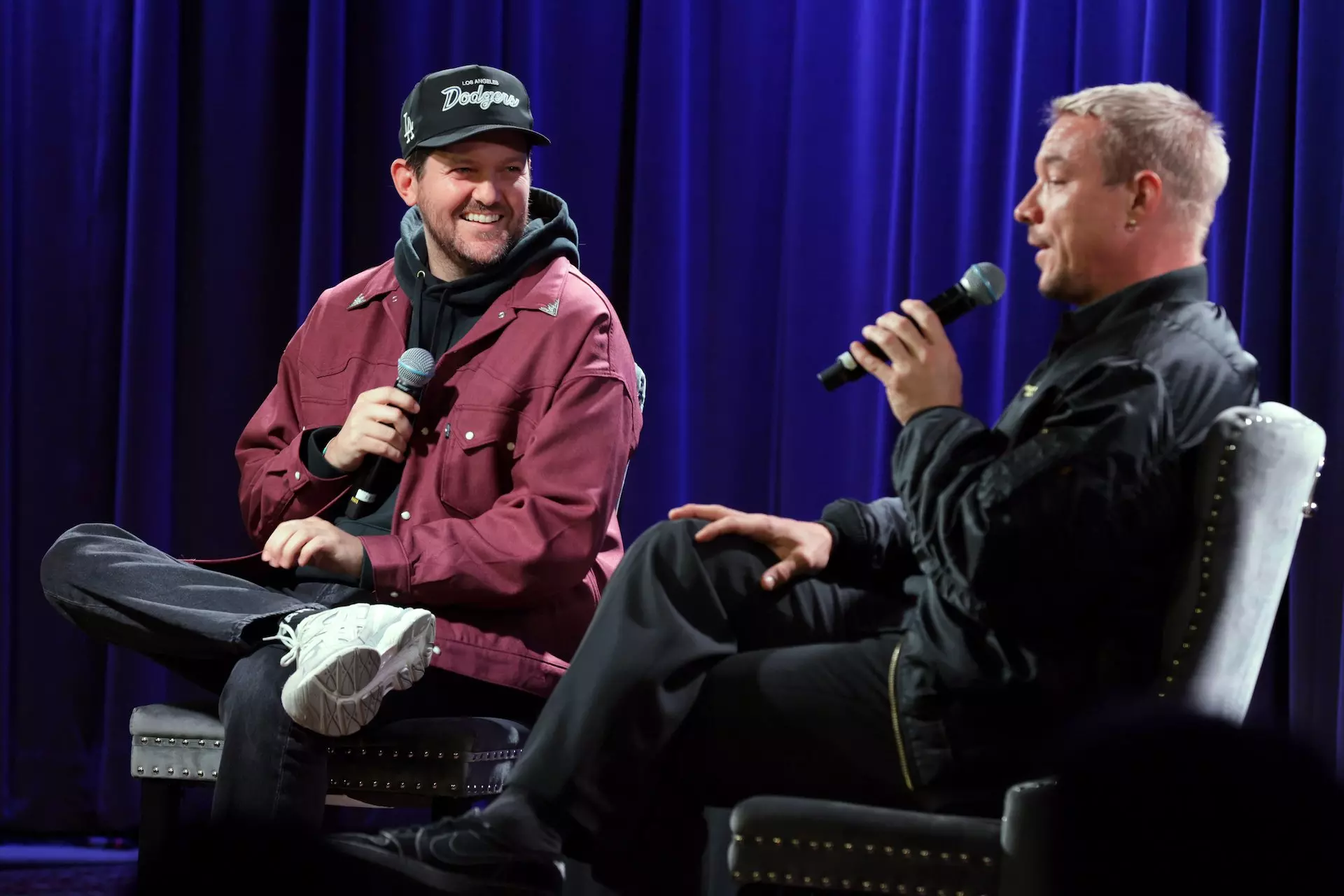
Dillon Francis & Diplo In Conversation: 5 Things We Learned From The GRAMMY Museum Event
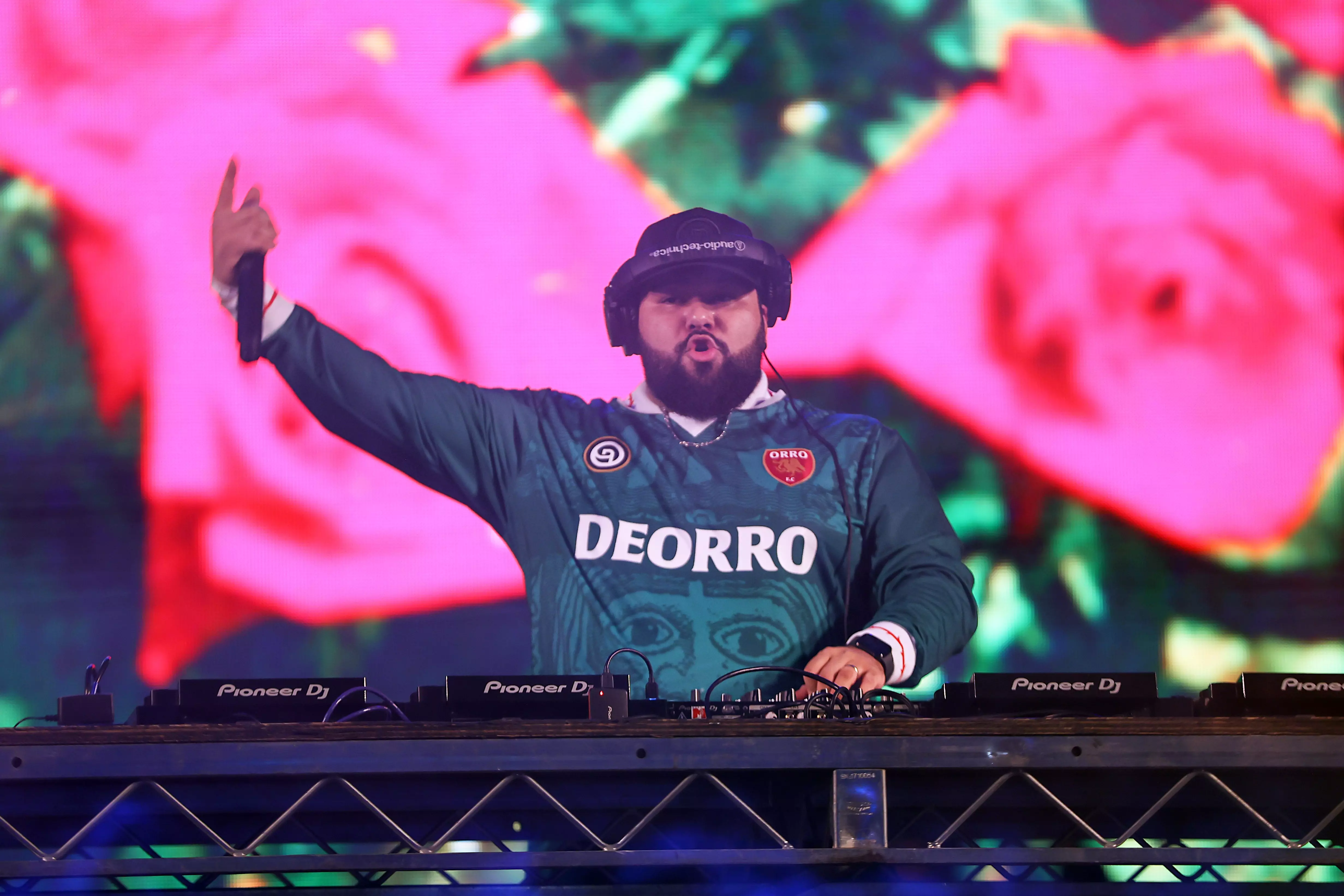
8 Essential Latin Electronic Releases: Songs And Albums From Bizarrap, Arca & More
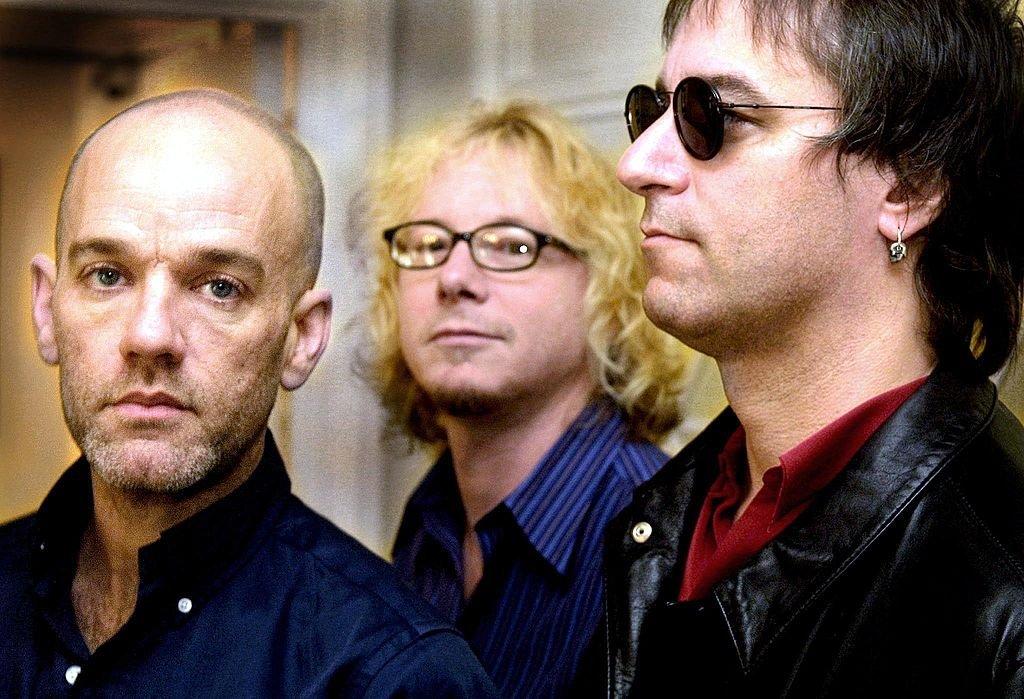
(L to R) Michael Stipe, Mike Mills and Peter Buck of R.E.M.
Photo: Odd Andersen/AFP via Getty Images
news
R.E.M., Hayley Williams, Tegan And Sara, My Morning Jacket, Phoebe Bridgers And More Contribute Unreleased Recordings To All-Star Compilation Benefiting Voter Rights
The 40-track compilation, available exclusively on Bandcamp for 24 hours only starting Friday (Sept. 4), will benefit voter rights organization Fair Fight
R.E.M., Hayley Williams, Tegan And Sara, My Morning Jacket, Phoebe Bridgers and many others have contributed unreleased recordings to Good Music To Avert The Collapse Of American Democracy, a newly released all-star compilation benefitting Fair Fight, a voter rights organization founded by former Georgia House Minority Leader Stacey Abrams that "promotes fair elections around the country through voter education, election reform, and combating voter suppression," according to a press release announcing the album.
The 40-track compilation, which features never-before-heard new songs, covers, remixes, live versions and unreleased demos, is available exclusively on Bandcamp for 24 hours only starting Friday (Sept. 4) as part of the online streaming platform's Bandcamp Fridays initiative.
See the full track list and artist roster below.
<style>.embed-container { position: relative; padding-bottom: 56.25%; height: 0; overflow: hidden; max-width: 100%; } .embed-container iframe, .embed-container object, .embed-container embed { position: absolute; top: 0; left: 0; width: 100%; height: 100%; }</style><div class='embed-container'><iframe style='border: 0; width: 400px; height: 472px;' src='https://bandcamp.com/EmbeddedPlayer/album=3851595333/size=large/bgcol=ffffff/linkcol=0687f5/artwork=small/transparent=true/' seamless><a href='http://goodmusic2020.bandcamp.com/album/good-music-to-avert-the-collapse-of-american-democracy'>Good Music to Avert the Collapse of American Democracy by Various Artists Working to Avert the Collapse of American Democracy</a></iframe></div>
Highlights from the Good Music compilation include a newly discovered Beverly Glenn-Copeland song from 1977; a cover of U.K. experimental rock band Broadcast by Paramore frontwoman Hayley Williams; a demo collaboration in progress between Death Cab For Cutie frontman Ben Gibbard and Tycho; and a cover of The Cure's '80s classic "In Between Days" by The National leader Matt Berninger. Other artists featured on the compilation include Flume with Eprom, Sudan Archives, Helado Negro, Jeff Tweedy, Sharon Van Etten and many others.
Read: How Bandcamp's Fee Waiver Days Are Supporting Musicians In The Pandemic
Author Dave Eggers, along with artist managers Jordan Kurland, Darius Zelkha, Christian Stavros and Barsuk Records label head Josh Rosenfeld, executive-produced the compilation; Good Music marks the fourth fundraising project around a presidential election from Eggers and Kurland.
Acclaimed street artist and fashion entrepreneur Shepard Fairey created the compilation's cover art. Bandcamp is also selling limited-edition signed screen-prints of the artwork; proceeds from the sale will benefit Color Of Change, the nation's largest online racial justice organization.
Read: The Recording Academy & Color Of Change Team Up To Promote Positive Change In The Music Industry
"It's going to come down to bringing out and protecting the vote this fall, so the work Fair Fight does is crucial," Eggers said in the press release. "Jordan and I figured a painless way to raise some money would be to ask musicians to donate unreleased tracks, people pay a few bucks for them, and maybe we can edge toward a functioning democracy again."
"As in our previous election-based projects, Dave and I were looking for a relatively simple platform for artists to get involved in the political process," Kurland added. "Seeing how impactful Bandcamp Fridays have become, we felt this was the perfect way to create urgency by releasing new music from a collection of amazing artists for a very short window of time."
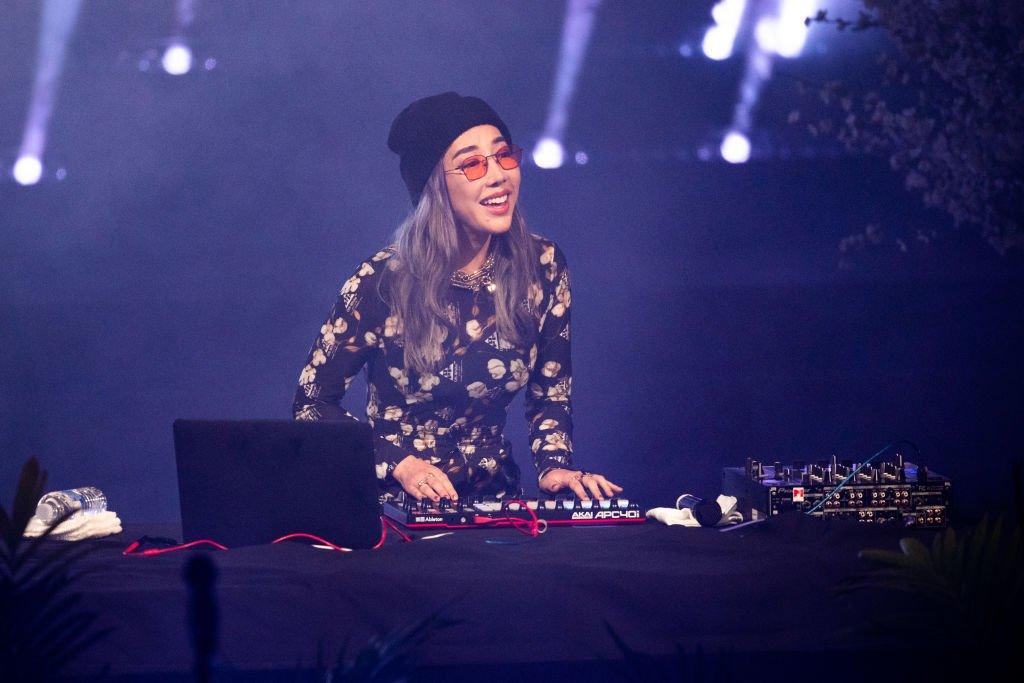
TOKiMONSTA
Photo: Timothy Norris/Getty Images
news
Lightning In A Bottle To Host DGTL LIB Fest Featuring TOKiMONSTA, KAYTRANDA, Four Tet, Tycho & More
Dive into the magic of the SoCal music and arts festival from the safety of your home with visually stunning music livestreams, yoga classes, sourdough baking lessons and more
Do LaB, the independent event brand behind the beloved Southern California Lightning in a Bottle (LiB) festival, has revealed details for a special Twitch livestream festival this weekend. As this year's festival was set to take place during Memorial Day weekend (May 22-24) but was canceled due coronavirus, DGTL LIB will bring the music, movement, magic and whimsy to fans around the world in its place.
KAYTRANADA, Four Tet, Rinzen, Justin Jay and the Funk Hunters, all of whom were on the lineup for the 2020 event, will perform special livestream sets. Tycho, TOKiMONSTA, Shiba San, CloZee and Beats Antique, all of whom have played past LiBs, will also be part of this weekend's fire musical offering.
Just as the camping fest is always so much more than its musical lineup, DGTL LIB will offer engaging programming including deep house yoga from one of Los Angeles' finest, DJ/producer Marques Wyatt, a sourdough bread baking lesson and a painting with coffee class.
House, techno and bass music favorites Luttrell, Autograf, Glitch Mob, Mr. Carmack, Eli & Fur, Sacha Robotti, Random Rab and others will also bring the beats during the long weekend. The event is created in partnership with female-run boutique design firm Vita Motus, who has created immersive digital stage experiences that select artists will use during the sets to add some visual pizazz to spice up the livestream flurry. Their Unreal Engine technology allows for "set design, lighting design, video mapped content, embedded performances, camera capture and more" to be shared via the Twitch stream.
WATCH LIST: Online Concerts From BTS To COASTCITY To Catch During Coronavirus Quarantine
"Here at Do LaB, we've always been forward thinking and our longtime partnership with Vita Motus has helped us bring our insane visions to life," said Jesse Flemming, President of Do LaB. "We are excited to be pushing the envelope with them again, but this time in the digital world."
To bring a taste of the rest of LiB's engaging programming online, The Compass (educational workshops and talks), ArtClave (interactive and live art spaces), the Learning Kitchen (food!) and Grand Artique stage will all bring offerings this weekend. The Compass will bring more yoga and meditation classes, in addition to Wyatt's groovy one, as well as talks, including "Aliens ExtraTerrestrials" with film producer Alan Steinfeld.
Behind The Board: TOKiMONSTA On Creativity And Finding Common Ground Through Music
Additionally, the Grand Artique will serve up a talent/variety show, live art, improv theater an open mic and more, with the help of wacky musical group the Fungineers.
The event is free to stream on Twitch, but will be accepting donations to help raise money to offer refunds to 2020 ticket purchasers who opted out of exchanging them for 2021 passes.
Join DGTL LIB here on Twitch from May 22-24 to discover some magic indoors this weekend.
Desert Hearts TV: How The San Diego DJ Crew Are Tuning In During The COVID-19 Crisis
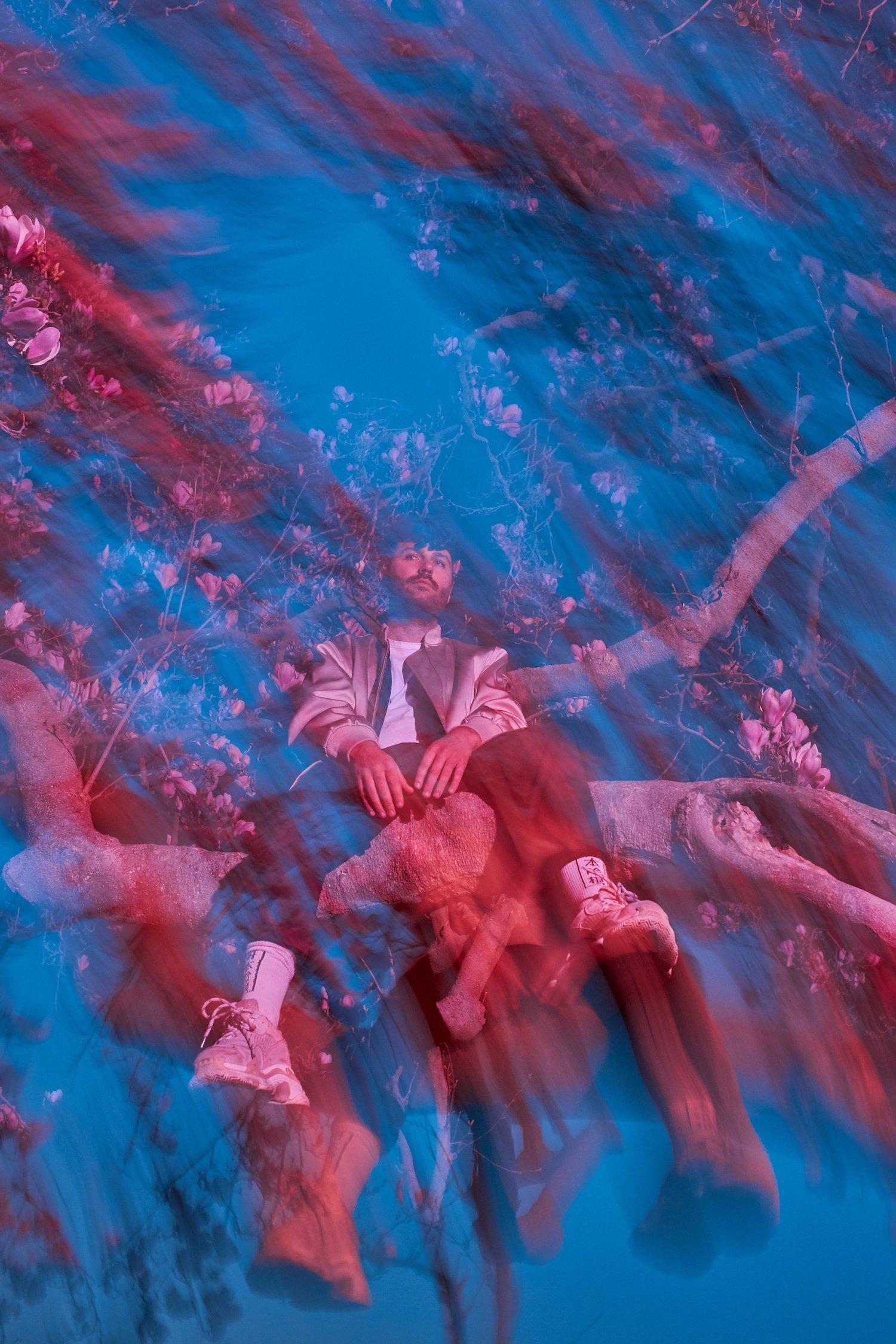
Mild Minds
Photo: Andrew Noel & Tegan Butler
news
Mild Minds Talks Debut Album 'MOOD,' Breaking Down "Walls" & Feeling Inspired By Four Tet
Ahead of the LP's March 13 release, we caught up with the Aussie electronic artist to learn more about his new project, finding new modes of creativity and inspiration and more
On Fri. March 13, electronic producer Mild Minds, a.k.a. Benjamin David, released his debut solo album, MOOD, via Foreign Family Collective. Within its nine tracks, the Australian-born, Los Angeles-based artist explores a variety of emotions and dreamy—sometimes dark—sonic textures. He sings on all of the songs and, on "WALLS," offers a poignant, layered commentary on creating barriers between people with the help of experimental indie act Boats.
David, who has worked in the electronic music space for some time now, first introduced the world to Mild Minds in October 2018, with the SWIM EP, which included his debut single, "Swim." The ford. remix of the track received a GRAMMY nomination for Best Remixed Recording at the 2020 GRAMMY Awards earlier this year. A slightly updated version of the track is also included on MOOD, which the artist says took form around the same time as the EP. Thus, the album is one of new beginnings, creative exploration and shifting moods.
Just ahead of the its release, we sat down with David to chat about the project, reimagining his creative process, finding freedom as an opening act and more.
Your album, MOOD, is dropping soon. What does this project mean to you and how are you feeling about releasing it?
Well, it's my first album, so it kind of represents the project as a whole because it was how it started, essentially. I actually made most of the album before I released the EP that I released about a year ago. It just kind of represents, for me personally, opening up my mind a little bit more. Because I'd been doing music for a long time but it's always been stuck in specific worlds and having to appease certain fans or management or bandmembers. So this was about just stopping the self-sabotaging road blocks, that we all do no matter what our live is.
I just wanted to see what would actually happen if I didn't stop myself. I'd normally make songs like this that were a little bit more underground and be like "nobody's going to hear it," blah, blah. And then I realized that that's not why I make music. You actually make music so that you can experiment and create something new. This was all about just doing that and having freeform structures and trying to learn how to avoid being mediocre and normal or something.
So you finished most of it around the time you were working on the SWIM EP?
A lot of it was made after; it was made in around 2017, mostly over six months. It's laughable because 80 or 90 percent of it was there and somehow it still managed to take two years to come out. And the differences that you may hear between those finished versions and non-finished would be not much.
I feel like that happens a lot. Did you feel like working on it was cathartic or the type of music that you'd been wanting to make for a long time?
Not necessarily the type of music that I'd been wanting to make stylistically or something, but more like the type of music that I probably wanted to make in terms of the way that I created it. Like not having to succumb to those things I mentioned, because it's very self-conscious, you don't even realize. You're in the machine for so long, doing what you have to do, trying to figure out how to keep streams up and things like that. Maybe it's more the way that I should have been making music, I guess. And the way everyone probably should.
I want to talk about the song "Walls," which you released when you announced the album last month. You said that it's both political and personal. Can you tell me a little more about that?
So there wasn't really any major intentions to collaborate with anyone on that track. I just showed it to my friend [Boats] and he started singing on it. He has this very deep voice but the way that he sings is less structured, so it was like smashing two worlds together a little bit.
Beyond that, his perspective was very political and he wanted to have this almost anthem for the political situation that we're in at the moment, probably internationally and also specifically talking about border walls. For me, I don't like political stuff to be too on the nose. I actually like music to be escapism, to get away from current issues. So we came up with this idea of having both meanings in the lyrics. I was singing it one way and he was singing it another way. And mine was more the relationship side of building walls between people.
What was it like collaborating with Boats?
It was a little bit harder in terms of the recording process because the whole point of this project was to be quick. And working with somebody else's voice and having to figure out what they're trying to do with harmonies and things like that, we spent weeks getting the rough vocals together. As opposed to the other songs, which might've been done in two days. So that really drew that song out for a while and I couldn't get it to sound how I wanted, which is probably also different to how he wanted. The process of collaborating on this project maybe gets in the way of the creativity a little bit, but ultimately, I couldn't sing that song and there's no way that it would sound like that without him. So it's the beauty of collaboration and the consequences of it, I guess.
Last month, you wrapped up your California mini-tour with Tycho and you also recently announced a Red Rocks date with Big Wild. What do you think are both the hardest and most fun parts of opening a show?
Well I'm sure there could be way harder parts than I've experienced, because I haven't done it that much. But in terms of supporting Tycho, whose music is almost ambient, coming in and playing something that was quite a bit more electronic and aggressive in some way, I was like, "Oh God, is this too early?" At like 8:00 p.m., 9:00 p.m. or something. But in the end, everyone, except for the first L.A. show, was really cheering a lot more than you would be used to for an opener; they were really supportive. That felt like it went down well, but that would be the hardest thing.
And then the best thing is that it's a totally different experience in terms of when you're the headliner, the pressure, it's almost like if something went wrong it wouldn't really matter. So it's way more enjoyable and stress-free and you're finished by 9:30 or 10. But also just with this project in general, I don't have as much gear. It's very quick. I've loved seeing that opener perspective and getting to enjoy playing in front of people and doing a show and playing, these were all really nice venues. I don't know how to put it other than that, that it is cathartic in a way. It's not stressful and it's a different experience of performing.
When I was listening to the album, I felt a definite summer mood. What you think makes a great summery, chill house track or playlist?
I always get questions like this no matter what music I make. So there's definitely something there about what comes out of me, but I feel like I never get those opportunities to have a pool, summer playlist, really. I don't really sit by the pool, I don't get to go the beach and stuff.
So you need a vacation.
Yeah. And I always let other people take care of the music or I listen on headphones to whatever is new. I never have specific playlists, because I'm always working. I would rather be listening to music that's going to have an impact on me. And thinking about creating more, than just relaxing by the pool too much. And if it is, then I let someone else pick that [music].
I would argue there's much more summer music than this, for me. This is my nighttime album. But I do know what you mean. They are, in the middle section and even a little bit at the start, it's definitely got a dreamy, upbeat feel to it.
Especially "Embracer," for me.
I think also more "SWIM" and "FORMATIONS," which they actually feel happier. But yeah, the second half of the album I feel like is more of a darker thing, which I really liked because it's different to what I normally do.
In speaking to, like you were saying, music that gets you in this space of working on your own music, who are some of your biggest musical influences? I see lots of vinyl over there.
Yeah. I have to be careful because I want to talk specifically about this album and not just in general. For this, it was not any specific person at all. There was definitely a moment where, something like Four Tet was a bit of an eyeopener, because I always assumed that music like that, non-vocal music, very extended, would be not listened to by many people.
I've known about him for a long time, but I started to realize, sure, his career took a long time to build, but it didn't really go down in any way. That gave me a lot more faith in terms of making music, and not caring so much about having to fit to the system and be this hyped up thing within like two years, even though that is still happening. This music's not as minimal as Four Tet, but definitely taking inspiration from the fact that you can have a career over a slow build and stuff like that. So that was a big inspiration.
Also, I was in this ambient bar in Japan and they were playing lots of more ambient, droney music which, for me, I didn't listen to. It totally changed my perspective on music because I always usually start with drums and stuff. I was like, "Wow. You don't actually need drums." Or if you do, it can just be this tiny pulse. It doesn't have to be big, upfront drums. That experience was a big influence, but I can't really put it down to a specific artist. And that's another cool thing I'm trying to do, take influence from experiences, not [just] music.
When did you first start listening to electronic music, and when did you start exploring production or making it yourself?
[I started making it] probably when I was 14. That was the beginning of computer programs that came with loops and then I learned how to make my own loops. But it was just fun to create things. In primary school you want to do the fun classes, right? It was something I naturally gravitated to and I was always interested in the technical side of things, so that played a part.
I was into electronic music pretty straightaway. Not when I was 13, 14, an angsty teenager, where rock was more of a thing at the time, like Limp Bizkit and stuff like that. But as soon as I discovered good electronic music, I definitely made the shift. It seemed like it could be much more creative and more, almost, design-influenced. The visuals are usually much prettier than say live music kind of projects, historically. That's opened up a lot more now. But rock in the late '90s and early 2000s was a specific thing. It was either extremely dark or extremely basic, and I've always preferred colorful kind of things. So, electronic music was pretty early on, probably about 16 or something.
And do you have any artists that you were like, "Oh dang, this is cool."
I mean the first thing that really switched me over was Air and Daft Punk because they had the most interesting sounds. It didn't just sound like a generic house track, which is what you would get on the radio through the late '90s and 2000s, or electro house and stuff like that. It was the first time that I was hearing what seemed like super creative things, that I'd never heard anything like before. And it had this '70s vibe but with synth, so much more synth than say, something you would have actually heard from the '70s, like America. Do you know that band America? They have a song "A Horse With No Name."
Downtempo but dreamy, like Supertramp or something. [Air and Daft Punk] really brought in all these new sounds. So I was very influenced by that at first and now, because I did that for so long with other projects, I just wanted to almost do the opposite. And I was like, "Okay, well what is the opposite?" And I started listening to U.K. garage-influenced stuff and non four-four beats and completely odd structures to get out of that. Then you can satisfy both sides and have two different mindsets.
What are you most looking forward to or feeling hopeful about this year?
The hardest thing is juggling all the projects at the same time, which I have to put a lot of work in this year. But I was really, really hoping that I could go into a second album for this by now. That was the goal, that I really wanted to carry the momentum while it's strong and get something out maybe the start of next year.
So more time in the studio with Mild Minds?
Yeah, especially if I refine the way that I do it and I have less, I don't use outside vocalists and I don't layer up my vocals heaps and I just keep it simple, which actually does sound better if you just do it properly once, as opposed to 25 times, finding the key that you're supposed to sing in. Two or three songs that took forever, it was really just me tweaking the vocals and rerecording them over and over because they were out of my range. And trying to layer a high vocal with a low vocal rather than just have a nice medium vocal.
I think changing a few little things like that, I could put an album together in three months. So that's the aim.
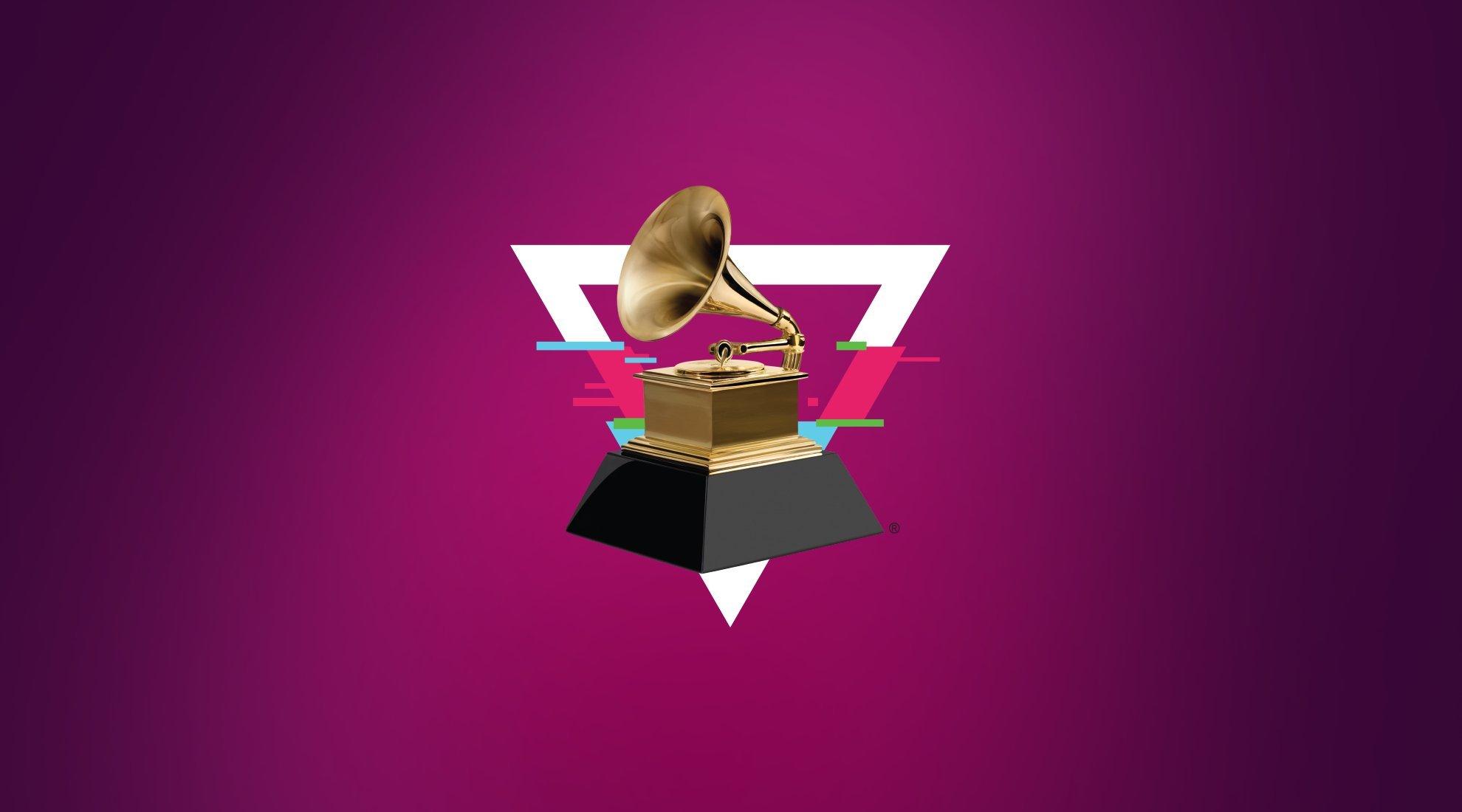
news
Poll: Who Will Win Best Dance/Electronic Album At The 2020 GRAMMYs?
Apparat, The Chemical Brothers, Flume, RÜFÜS DU SOL and Tycho are all in the running for Best Dance/Electronic Album at the upcoming 62nd GRAMMY Awards—tell us who you think will win
It's finally 2020, which means it's almost time—20 days from today!—for the 62nd GRAMMY Awards. While the final voting period has officially ended, there's still plenty of time for us to dive into the nominees and hypothesize on this year's winners. Today, let's take a look at the epic Best Dance/Electronic Album category for 2020, for which Apparat, The Chemical Brothers, Flume, RÜFÜS DU SOL and Tycho are all nominated.
Stay tuned to GRAMMY.com to learn more about some of this year's nominees in our ongoing First-Time GRAMMY Nominee interview series.
LP5, Apparat
<style>.embed-container { position: relative; padding-bottom: 56.25%; height: 0; overflow: hidden; max-width: 100%; } .embed-container iframe, .embed-container object, .embed-container embed { position: absolute; top: 0; left: 0; width: 100%; height: 100%; }</style><div class='embed-container'><iframe src='https://www.youtube.com/embed/F8tLQbajsfI' frameborder='0' allowfullscreen></iframe></div>
German-born, Berlin-based Sascha Ring, aka Apparat, may be a first-time GRAMMY nominee, but he's been making waves in the underground house scene for the last two decades. In the '10s, his haunting vocals and ethereal rhythms echoed across countless dance floors with emotive club cuts like 2014's "Bad Kingdom," which he released as Moderat, his collab project with Modeselektor, and the 2013 track "Nices Wolkchen," his collaboration with DJ Koze.
With 2019's LP5, Ring's succinctly titled fifth solo studio album and his first since 2011's The Devil's Walk, he serves up a dark, moody and deeply immersive soundscape. (In between, he also released a score for a theatrical rendition of "War and Peace" as well as the albums II and III with Moderat). For LP5, he brought frequent collaborator cellist Phillipp Thimm into the studio, as well as other horn and string instrumentalists to add deep texture. LP5 is one of those albums you have to listen to a few times to really absorb and begin to grasp all its parts. But once it fully hooks you, it's impossible to forget.
Explore: From Social Media To Streaming: 10 Moments That Changed The Landscape Of Music In The 2010s
No Geography, The Chemical Brothers
<style>.embed-container { position: relative; padding-bottom: 56.25%; height: 0; overflow: hidden; max-width: 100%; } .embed-container iframe, .embed-container object, .embed-container embed { position: absolute; top: 0; left: 0; width: 100%; height: 100%; }</style><div class='embed-container'><iframe src='https://www.youtube.com/embed/qx_fvEhWwwo' frameborder='0' allowfullscreen></iframe></div>
Four-time GRAMMY winners The Chemical Brothers are in the running for three more golden gramophones this year, thanks to their triumphant ninth studio album, No Geography. In addition to a Best Dance/Electronic Album nod, the 2019 LP is up for Best Dance Recording for "Got To Keep On" and Best Music Video for "We've Got To Try."
The iconic U.K. house and techno duo, composed of Tom Rowlands and Edward Simons, met at university in Manchester in the late-'80s, cutting their teeth in the emerging underground house scene there. In 1995, they released their debut studio album, Exit Planet Dust, as The Chemical Brothers, and in 1999, they broke big on both sides of the pond with their seminal third album, Surrender, featuring dance classics like "Out Of Control" and "Hey Boy Hey Girl."
2019 not only saw the duo's first album in four years with No Geography—since 2015's Born In The Echoes—but also the 20th-anniversary reissue of Surrender and a massive world tour to celebrate both.
Read: Flume, Pink, Keith Urban & More Artists Donate To Australian Brush Fire Relief Aid
Hi This Is Flume (Mixtape), Flume
<style>.embed-container { position: relative; padding-bottom: 56.25%; height: 0; overflow: hidden; max-width: 100%; } .embed-container iframe, .embed-container object, .embed-container embed { position: absolute; top: 0; left: 0; width: 100%; height: 100%; }</style><div class='embed-container'><iframe src='https://www.youtube.com/embed/8mP_cBb40qo' frameborder='0' allowfullscreen></iframe></div>
In 2012, a then-21-year-old Flume released his self-titled debut album on indie Aussie label Future Classic. The album, acclaimed by fans and critics alike, featured bassy, trip-hop-esque beats and collaborators like fellow Aussies Nick Murphy and Moon Holiday, as well as an epic Otis Redding sample on "Holding On," who offered unique texture and flavor to the vibey tracks. In 2016, Flume, born Harley Streten, served up a new version of his sound with Skin, which earned him his first GRAMMY win, for Best Dance/Electronic Album, in 2017.
While 2019's 17-track Hi This Is Flume is technically a mixtape and not his anticipated third album, it serves as guidance toward where the electronic wunderkind's ever-evolving sounds may be taking us next. The mixtape features deeper experimentation with glitchier, more industrial sounds: At Lollapalooza, he broke things onstage to this effect. It also brings in some new collaborators, including two tracks with 2018 GRAMMY nominee SOPHIE, one of which features Skin artist KUCKA (listen to "Voices" above) as well as one with rising experimental rapper JPEGMAFIA.
SOLACE, RÜFÜS DU SOL
<style>.embed-container { position: relative; padding-bottom: 56.25%; height: 0; overflow: hidden; max-width: 100%; } .embed-container iframe, .embed-container object, .embed-container embed { position: absolute; top: 0; left: 0; width: 100%; height: 100%; }</style><div class='embed-container'><iframe src='https://www.youtube.com/embed/R6w4EI6bVfs' frameborder='0' allowfullscreen></iframe></div>
Aussie live electronic trio RÜFÜS DU SOL exceeded many fans' expectations with their third studio album, 2018's deep, emotive SOLACE. For each project thus far, Tyrone Lindqvist, Jon George and James Hunt pick a new city to work and record in. For SOLACE, they hunkered down in their temporary home studio on Rose Avenue in Venice, Calif, after two years on the road. One of the album's singles, "Underwater," is also up for Best Dance Recording, earning the group their first two GRAMMY nods.
Also in 2018, they launched their own record label, Rose Avenue Records, to which they've signed (and collaborated with!) rising electronic acts Cassian and Lastlings. It was only back in 2014 when RÜFÜS released their debut album, Atlas, so it's safe to say the guys had a good decade.
Another Poll: Who Will Win Best Pop Vocal Album At The 2020 GRAMMYs?
Weather, Tycho
<style>.embed-container { position: relative; padding-bottom: 56.25%; height: 0; overflow: hidden; max-width: 100%; } .embed-container iframe, .embed-container object, .embed-container embed { position: absolute; top: 0; left: 0; width: 100%; height: 100%; }</style><div class='embed-container'><iframe src='https://www.youtube.com/embed/u-SHHwAJDY8' frameborder='0' allowfullscreen></iframe></div>
As ethereal chillwave outfit Tycho, San Francisco's own Scott Hansen makes peaceful yet powerful music perfect for enjoying sunsets or sunrises. In fact, the two-time GRAMMY nominee's annual sunrise DJ sets in the Nevada desert at Burning Man are a mecca of sorts for his fans. When performing live, Tycho is built out with Hansen's full touring band, some of whom also collaborate in the studio, a favorite for those magic golden hour sunset festival sets.
For Weather, Tycho's fifth studio album since his 2006 debut, Past Is Prologue, Hansen pairs his chill, ambient beats with dreamy vocals from Saint Sinner. It's his first project featuring lyrics, and not an insubstantial amount, as she sings on five out of eight of the album's tracks. Because of this, it feels fresh yet still familiar and comforting, an exciting shift for the beloved multi-instrumentalist/producer/visual artist.
Don't forget to tune in to the 2020 GRAMMYs live on Jan. 26 to find out who will take home the Electronic/Dance gramophone this year, as well as all the other 83 exciting categories. In the meantime, stay tuned to GRAMMY.com (sign up for our weekly newsletter digest above!), our social media channels (follow us on Facebook, Instagram and Twitter) and our YouTube page to keep up on all things 2020 GRAMMYs and beyond.
Poll: Who Do You Think Voters Will Pick To Win Best Rap Album At The 2020 GRAMMYs?
